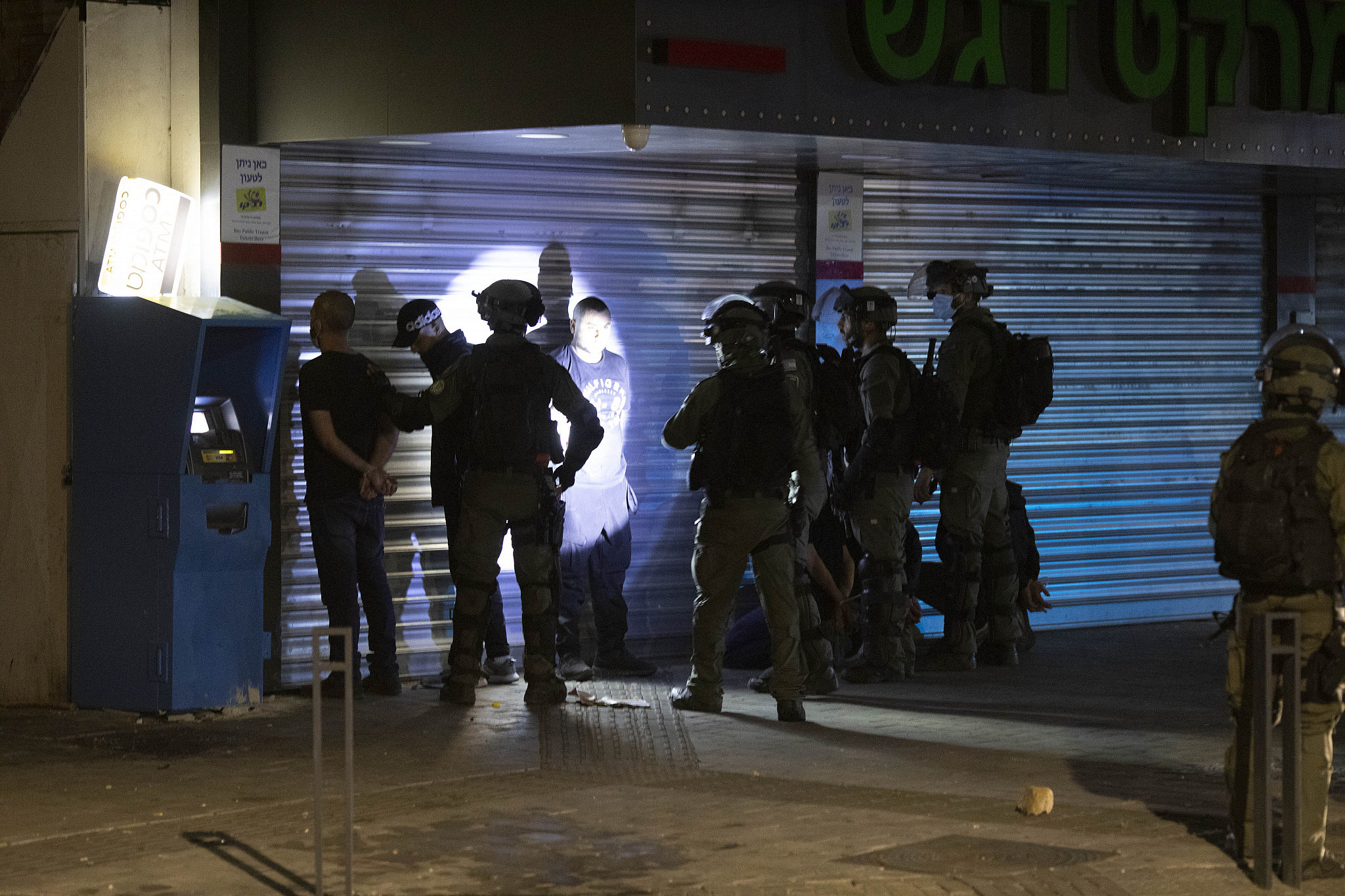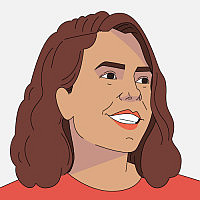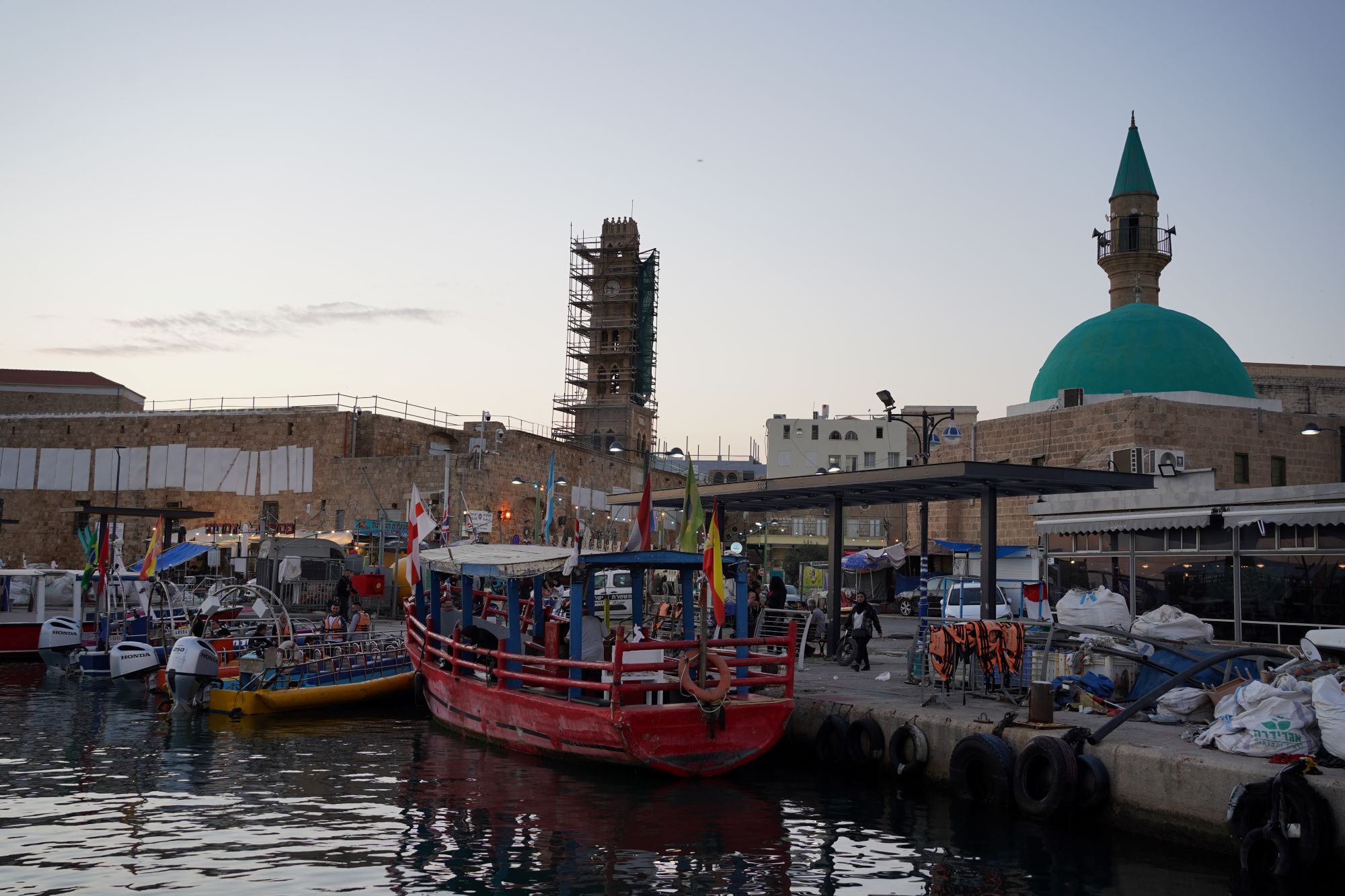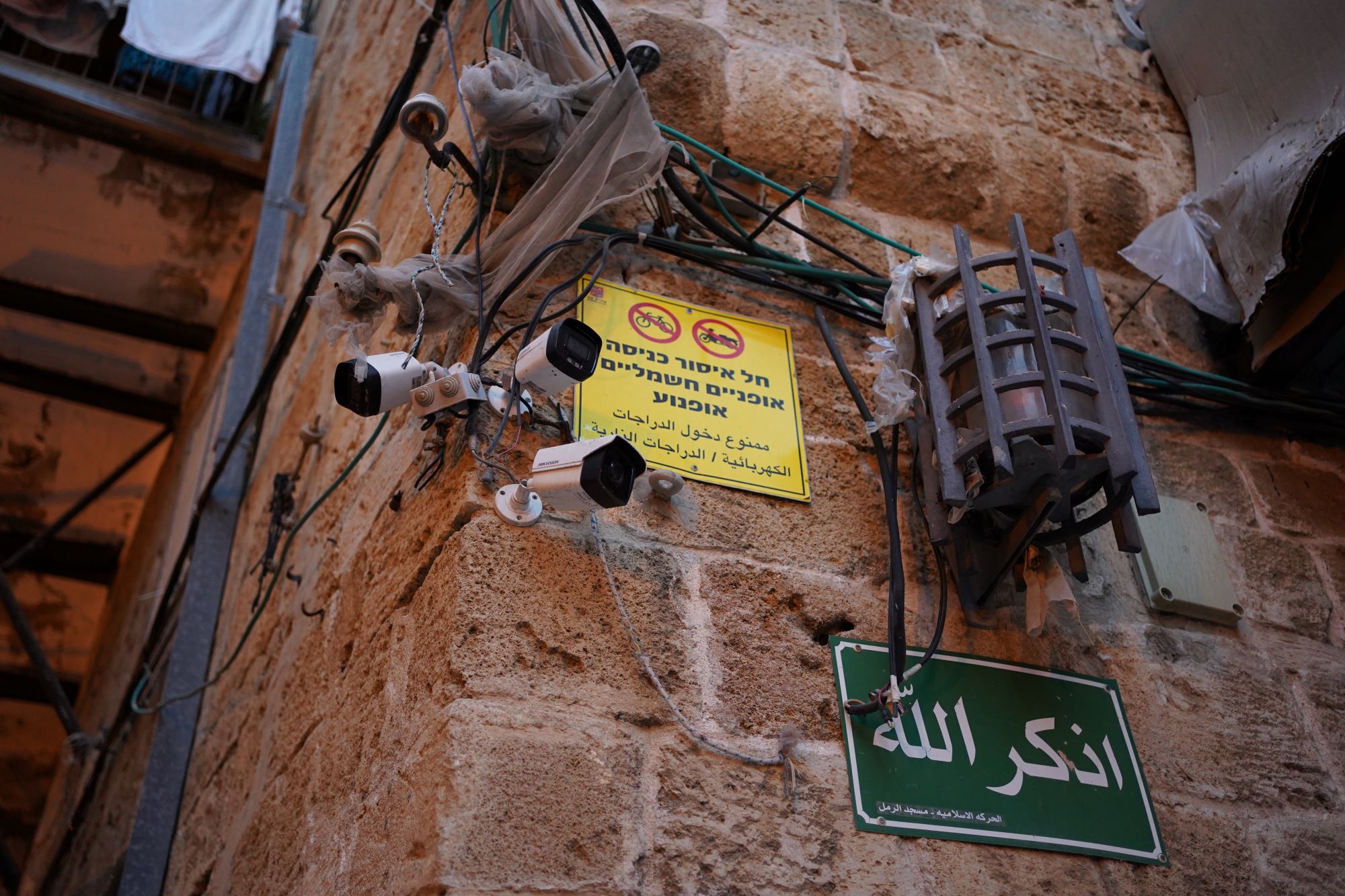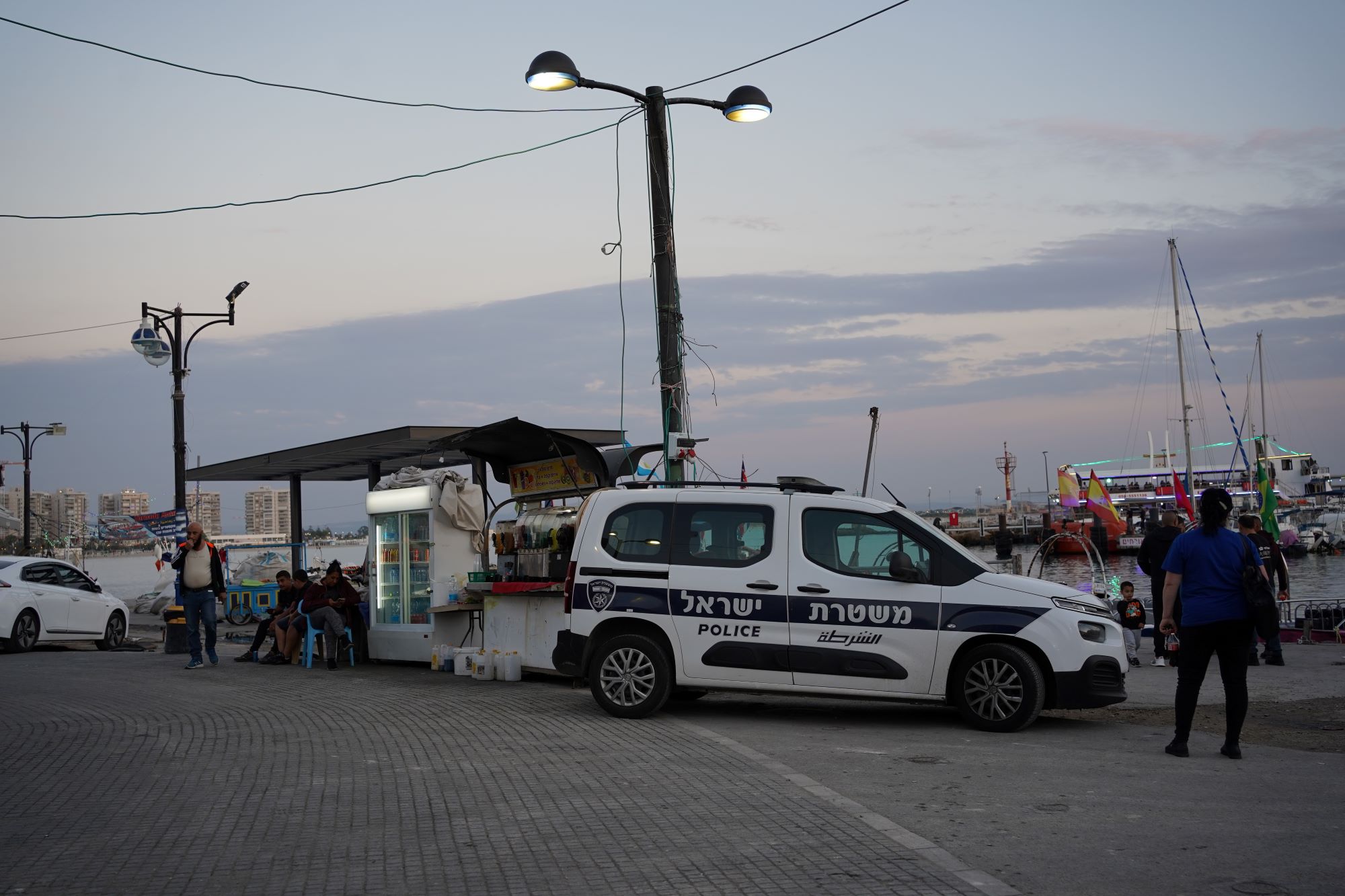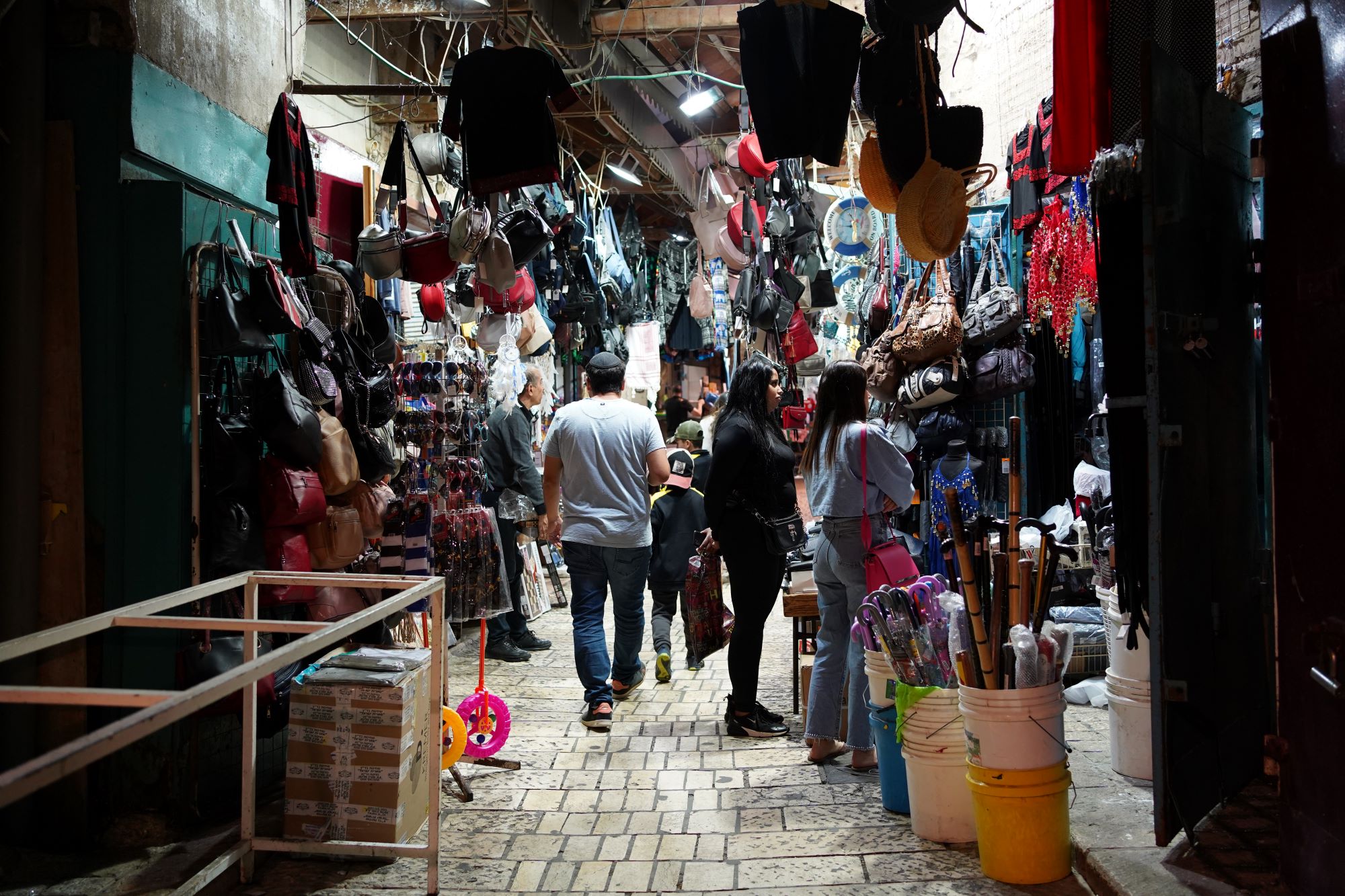“It is very hard that my son is far away and separated from me. I feel it is an injustice, and nothing is harder than for a mother to feel that her son is oppressed.” These were the words of Umm Haitham Ali, the mother of a convicted 27-year-old Palestinian citizen of Israel from Akka who has been incarcerated for a year and a half, and whose life has been overshadowed by turbulent events that unfolded in the city in May 2021.
During that month, Akka (known in Hebrew as “Akko” and in English as “Acre”) like other localities, was consumed by a Palestinian uprising that spread between the Jordan River and the Mediterranean Sea, and which was met with a large-scale campaign of Israeli repression. In so-called “mixed cities” like Akka — historically Palestinian centers that acquired large Jewish populations through forced expulsion and gentrification since the Nakba of 1948 — protesters took to the streets to demonstrate, while gangs and mobs vandalized property and attacked residents of other national groups. Both Jews and Arabs partook in the violence, although Jewish citizens tended to have the protection, and sometimes active cooperation, of the Israeli police.
The reprisals did not stop there. Over the next 15 months, the police and the Shin Bet, Israel’s domestic security service, continued to arrest and indict Palestinians from Akka, especially those in their 20s, over what happened in the city in May. In early September 2022, the Shin Bet accused five men from the city of involvement in an attack “with a nationalist motive” against a Jewish Israeli civilian, Mor Janashvili, on May 12 of last year; according to media reports, the assailants were carrying sticks and knives while driving around the city (one of the convicted assailants was sentenced this week to ten years in prison). Janashvili sustained several injuries and was saved by a Palestinian nurse who, along with others, tried to contain the situation.
“We were preparing for Eid, when we heard noises in the streets,” Umm Haitham recalls of that night. “Word began to circulate that the local mosque was burning, so my boy rushed to see what was happening. He did not even have time to think.”
Throughout that week, young people in the neighborhood had been going out to protest the escalating attacks on Arabs in the city and across Palestine, Umm Haitham said. Yet that night, she couldn’t believe her eyes when she saw all the damage and burning in the streets. She had never expected that young men would cause such vandalism, saying that she suspects “invisible hands” were behind much of what had gone wrong during those days.
Nearly three weeks later, on May 30, 2021, the Israeli police arrested Haitham. He was held in detention until May 17 of this year, and formally sentenced and imprisoned ever since.
“My son is a victim, not a hero,” she said. “He is a victim of the situation he found himself in, just like most of the young men from Akka.”
The family of Umm Haitham, a widow who lives with her older son and younger daughter and son, does not own a car, so she carpools with other families from Akka to visit their sons in prison. “It is such a tough experience,” she said. “The prison authorities are very strict, and it is very expensive to wire him money.”
Haitham told his mother that it pains him not to be by her side, and to be causing her such difficulties. He regrets leaving the house that night, she said.
Umm Haitham described what Akka went through that month as a “nightmare,” yet fears that things could continue to deteriorate badly for her son and others like him. “I’m afraid that they [the police] would frame the boys as terrorists,” she said. “Or that they would get radicalized inside the jails. I want them to live their lives when they get out and do not want them to be molded by these circumstances.”
Shin Bet tactics
Haitham was one of many Palestinian citizens whose cases were handled by the Israeli authorities as a “security threat,” his lawyer, Aram Mahameed, told +972. Along with seven others, he was accused of attacking the Jewish-owned Al-Afandi Hotel in Akka on May 11. The authorities claimed in the indictment that the group had carried out the attack with a racial motivation and aimed to terrorize the 20 guests who were staying at the hotel.
Mahameed said that as a “security case,” the detainees were interrogated by the Shin Bet, deprived of seeing a lawyer, and often subjected to forms of psychological torture. He explained that the Shin Bet does not list the questions and answers of their interrogations, as the police are obligated to do, but rather submits a written summary of the investigation without an audio or video recording.
Mahameed told +972 that Haitham and others from Akka were interrogated for 16 hours or more at the time, and that the Shin Bet pressured and manipulated the detainees into confessing against each other. Tellingly, he noted, most of the evidence the Shin Bet used in its indictments was confessions, rather than tangible proof. The other young men from Akka claimed that Haitham was vandalizing a hotel with them, but Haitham says he was at home at the time. Mahameed added that several other young men were accused of the same actions.
The Shin Bet did not respond to +972’s request for comment.
In its indictment, which was viewed by +972, the police accused the group of using Molotov cocktails and setting fire to the hotel entrance and lobby, and later claimed that they had vandalized property inside the building. Haitham is even accused, allegedly with the help of another person, of stealing a safe from the hotel and leaving with around NIS 1,100, two bracelets, and various documents. The authorities put the loss caused by the vandalism at NIS 2 million.

The indictment further claims that a few minutes after Haitham and the seven others left, several other men arrived at the hotel and set it on fire, which led to the death of an elderly Jewish Israeli who died several weeks later from burns and smoke inhalation. It also stated that Haitham and three others went to Akka’s Turkish Bazaar, masked, and attacked a municipality security guard with punches and kicks.
The indictment against Haitham and the other seven lists the names of 146 witnesses, most of whom are policemen and Shabak agents. According to Mahameed, Haitham was given a “partial” trial, whereby the court heard several of these listed witnesses, before the indictment was eventually adjusted to contain lighter charges in a deal with the defense. Still, with a long charge sheet, the court sentenced Hatham to 42 months in prison.
“They did not know what to accuse him of, but they kept looking for offenses,” said his mother. “They accused many of our sons of that same offense.”
Uprising and repression
The May 2021 uprising initially began as a wave of support for Palestinians in Jerusalem who were struggling on two fronts: first, protesting for freedom of worship and festivities on the Al-Aqsa Mosque compound during Ramadan, in the face of Israeli police restrictions and attacks at the site; and second, for residents of the Sheikh Jarrah neighborhood, who were threatened with Israeli expulsions in favor of Jewish settlers.
The protests diffused across historic Palestine and the diaspora, and intensified greatly as Israel began bombarding Gaza, following Hamas rocket fire from the strip aimed at preventing the Israeli far-right “Flag Day” march in Jerusalem. The protests also spread to most of the coastal cities and Arab towns inside Israel.
The security authorities, taken by surprise, reacted by violently attacking the protesters throughout the country. In the “mixed cities” of Lydd, Ramle, Jaffa, Haifa, and Akka, the violence was further characterized by the involvement of extreme-right Israeli vigilantes, including settlers from the occupied West Bank, and members of religious-Zionist communities that were established in the heart of Arab neighborhoods.
Two Arabs were killed in clashes with security forces and extremists: 28-year-old Musa Hassuna was reportedly shot by a right-wing Israeli who opened fire at a protest in Lydd, and 17-year-old Muhammad Kiwan was shot by police in Umm al-Fahm. Two Jewish Israelis were also killed during the unrest: 84-year-old Aby Har-Even died from burns and smoke inhalation when the hotel he was staying at in Akka was arsoned, and 56-year-old Yigal Yehoshua died from a head injury after Palestinians pelted his car with rocks in Lydd. Others, such as Mor Janashvili or Said Moussa, were severely beaten by mobs and nearly lost their lives.

A few weeks later, the Israeli authorities launched a surprise campaign, called “Operation Law and Order,” in which thousands of police officers and army reservists arrested hundreds of Palestinian citizens of Israel accused of participating in May’s mass protest wave, in vandalism, and in violence against Jewish Israelis. In the summer of 2021, raids, arrests, and jail time became the reality for many Palestinians in Israel — sometimes because they participated in protests, other times even because they expressed a political opinion. Scores of Arab men are still subject to Israeli sanctions, with their detention extended time after time, and with serious indictments filed against them.
The Israeli Public Prosecution recently announced it had submitted 397 indictment lists against 616 defendants in the context of the May events, 89 percent of whom are Arabs and 26 percent of whom are minors. The Public Prosecution specified in the report that indictments were filed in 108 incidents against 239 defendants in “aggravating circumstances of a terrorist act or racial motives,” 85 percent of them Arab and 15 percent Jews.
Local activists from Akka estimate that throughout May and the following months, Israel detained between 200 and 300 Palestinian residents of the city. Today, 33 men from Akka remain imprisoned while another nine are under house arrest. Mahameed, Haitham’s lawyer, noted that most of the men charged were living under various forms of subjugation, social pressure, and socioeconomic disadvantage, all of which he said are intricately tied to a reality of institutional injustice, inequality, and unmet needs of Palestinian citizens compared to Jewish Israelis.
‘Akka became another Jerusalem’
In the absence of much-needed support from official and local community institutions, a group of 10 young men from Akka began volunteering to support the families of detainees to cope with the ongoing arrests of their sons, some of whom were minors who had no previous experience of protesting, arrests, or investigations.
One of these activists is Khalid Al-Sayed, an Akka resident, journalist, and researcher. Al-Sayed explained to +972 that Israel has for decades tried to impose a process of “Israelization” on Akka, despite its historical Palestinian identity and its large Palestinian community.
He criticized Israel’s attempts to paint a picture of “coexistence” between Jews and Arabs in cities like Akka, Jaffa, and Lydd, where the reality is in fact of visible segregation and discrimination. “Israel has tried to frame a fake identity for the city by increasing the number of Jewish residents, gentrifying the Old City,” Al-Sayed said. He further pointed out how Israeli officials and the media quickly steered the conversation in May toward portraying Arabs in these cities as a security threat, despite being Israeli citizens, while inciting against them and demanding forceful police responses.
Al-Sayed disagreed with the belief held by some analysts that Arab youth in the city took to the streets that month merely because of a lack of socio-economic horizons. Rather, he argued, the youth came out due to a strong sense of their collective Palestinian identity — an identity that Israel attempts to violate and strip them of daily. This national consciousness, Al-Sayed elaborated, was sharply felt during the uprising and connected Palestinians of all stripes and geographies, leading the youth to demonstrate spontaneously and independently, without any leadership or partisan affiliation.

After the killings of Hassouna in Lydd and Kiwan in Umm al-Fahm, Palestinians in Akka decided to make sure that “we are not going to be an easy target” for the Israelis, said Al-Sayed. “I was in the streets with the young crowd and followed social media too, and heard the youth saying how much they would like to express themselves through protest.”
During the summer of 2021, the rhetoric in the streets changed to something that Al-Sayed said was unprecedented: Akka’s Palestinian citizens started to express more care about politics, supported the families of the detainees, and listened to nationalistic songs. The protesters primarily focused on the Haredi gentrification of Akka, Al-Sayed explained, which they feel is particularly hurting the city.
This, he notes, was what disturbed the security echelon the most: Palestinian residents of Akka were recognizing this process as part of Israel’s continuous settlement of their land and homes, all while the native inhabitants were being crammed into crowded neighborhoods with unlivable conditions.
The Israeli authorities, bristling at the shift, went about making life unbearable for the city’s Arab residents, claims Al-Sayed. “I remember last May, some 13-year-old Arab boys were swimming at sea and had an argument with Jewish boys,” he said. “The police arrested [the Arab boys] and accused them of acting out of nationalistic motives.” Almost every month since, he added, there has been at least one arrest in Akka over what Israel calls a “nationalistic background,” implying an Arab detainee who partook in political activity and most likely would be accused of terrorism.
“Akka became another Jerusalem,” Al-Sayed lamented. “The Israeli media incites against us, and the Shabak [Shin Bet] controls the narrative. [Itamar] Ben-Gvir [the head of the far-right Otzma Yehudit, or “Jewish Power,” party] intentionally visits Akka to stir things up, and the situation is very heavy.”
For Al-Sayed, where Akka differs from Jerusalem is that the former’s Palestinian community has very little political organizing on the ground, lacks a strong sense of collective national consciousness, and historically has rarely acted as one united group. “Our detainees are not really politically aware, especially the younger ones in Megiddo prison,” he said.
Meanwhile, the local Arab leaderships in Akka, sheikhs, and municipality representatives effectively abandoned the detainees and did not provide real support for their families, instead condemning and accusing them of being criminals.
“Yes, some of them have a criminal record, but not all of them,” Al-Sayed said. “Committing a crime was not why these young men went out to the streets and risked being jailed or even killed. But the leadership has political and personal motives built on the rhetoric of ‘coexistence,’ which is part of the Israeli privileged narrative and not necessarily the Arab one.”
Volunteering to support families
Within that vacuum, 10 volunteers, including Al-Sayed, established their local youth committee and began to accompany the families of the detainees to court sessions, follow up with the cases, and, most importantly, turn the narrative around these detainees from a criminal to political one. The committee held public talks and protests to raise awareness about how the Israeli security forces were targeting Akka, raised money for families in need, and encouraged Arab lawyers to volunteer to defend the detainees. The volunteers also aim to provide a support hub for the young men upon their release from jail.
“The local [Palestinian] leadership demonized the detainees and called them thugs,” Al-Sayed said. “But this is the same leadership that for years did not embrace the young men in Akka and instead marginalized them. When they were not included, their natural response to the uprising was to seek their rights and express themselves freely.”
Another committee member, Mohamed Nassra, told +972 that because of the glaring injustices perpetrated by the Israeli authorities against Palestinians in Akka and elsewhere, he expects another uprising might happen in the near future. “The aggressiveness and radicalization of the government are on the rise, [and] for every action there is a reaction. When they inflict racism and segregation on us, people suffocate. Then they market the myth of coexistence to outsiders, while they make us live under daily harassment and the Israelization of the city.”
Nassra, who witnessed firsthand the brutality of the police on the streets of Akka during those days, said that it was expected that the Israeli police would attack Palestinians when they protest the war on Gaza. “They have been oppressing us for seven decades, but the police on the night of the protest on May 12 used excessive brutality and wounded two men with live fire, preventing medics from treating them. They also fired rubber bullets and tear gas canisters. I remember they pulled a 14-year-old girl by the hair on the ground and arrested her.”
At the same time, Jewish Israelis in Akka started inciting against Arabs, Nassra said. “About 60 Jews went up the roof of one hotel in the Old City and started chanting ‘death to Arabs.’ Later, Jews started calling to take up arms and attack Arabs. The police knew and did not stop them. In mixed neighborhoods, they attacked Arab houses. Things escalated and Arabs lost control.”
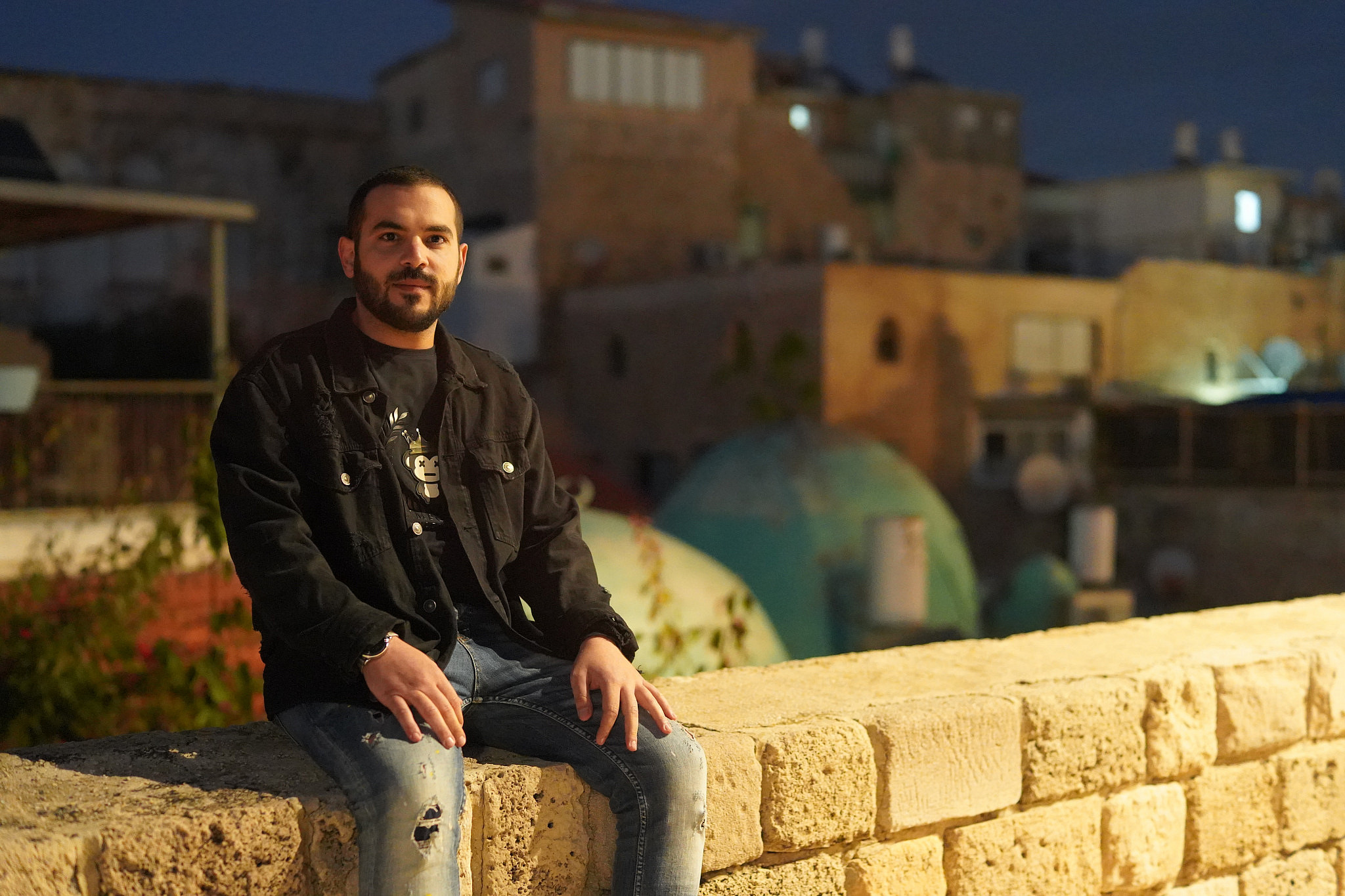
The police wanted to teach Arabs in Akka a lesson, not to stop attacks, Nassra continued. “We saw with our eyes not only how the police enabled the attacks but also participated in those attacks against us. They shot at every house whose residents tried to document the police attacks with their phones.”
In the midst of all that, Nassra said, he and the nine other activists formed the committee in the absence of the Arab leaders’ support, and in the face of the Shin Bet’s brutal methods of arresting and interrogating the young men, depriving them of their rights to call a lawyer, and using psychological torture tactics.
Nassra said that in the beginning, the Israeli authorities arrested Arabs of various ages and from all societal categories, but later focused on detaining minors and those coming from difficult socioeconomic situations. He added that the Israeli authorities threatened families who rely on national insurance support, or who live in public housing, while their sons were incarcerated. “The pressure we experienced in Akka got very ugly and intense,” he said.
He said that the Akka committee was in touch with similar committees and local activists in Lydd, Ramle, Haifa, and Jaffa. Praising the outpouring of support from Palestinians during and after the uprising, Nassra said that the emotional and financial backing has been critical to holding up the community. “Lawyers volunteered, [as did] social workers, psychologists. Even the visits from ordinary people to the city were seen as enormous support.”
In a comment to +972, the Israel Police spokesperson called the claims that officers enabled Jewish rioters and tried to prevent Palestinian citizens from documenting police activity “unfounded,” and said that the police sent reinforcements into Akka in order to “reduce disturbances” in order to “protect and maintain the lives of the residents.”
According to the spokesperson, during the violence of May 2021, the police “conducted daily situation assessments and followed the developments in the city, with the priority given being first to life-threatening events, including arson, when dozens of guests were rescued by police, firefighters and civilians, thus saving lives.” The police, said the spokesperson, handled and investigated the incidents of disorder with “equality and impartiality regardless of the identity of the suspects or victims.”
Moreover, the police spokesperson stated that during and after the disturbances, as part of Operation Law and Order, “dozens of rioters were arrested in the city, including those suspected of opening fire, committing arson, vandalizing property, causing damage, throwing Molotov cocktails and more. The investigative files on the various incidents are now being conducted after indictments have been filed.”
A fund for dignity and hope
In the midst of the mass arrests during the uprising, hundreds of Palestinian lawyers across the country formed volunteer groups to provide legal defense for detainees at police stations and in the courts. One of the main centers was in the northern “mixed” city of Haifa, where lawyers and legal centers helped to coordinate with popular committees in other towns, including Akka, to ensure representation.
The lawyers soon realized that the work would have to continue for weeks and months after the uprising, which meant further organization was needed. With the help of the Palestinian youth association Baladna, activists and lawyers established the “Dignity and Hope Detainees’ Fund” to gather money and resources to provide legal representation for the defendants and to support the detainees’ families. Some of these families, “many of whom already live in dire socio-economic conditions,” as stated on the fund’s website, are so poor that they cannot even afford public transportation to the jails to visit their sons.
Baladna and the project’s lead lawyers, all of whom are women, managed to cultivate financial support through online crowdfunding, advertising campaigns, and holding public events and fundraisers to encourage people to donate. The fund helped more than 60 families, mainly from Akka, Haifa, Lydd, and the Naqab/Negev.
“The social solidarity we experienced in May was qualitative,” said Lubna Tuma, one of the lawyers involved in the fund who also volunteered to represent detainees in Haifa.
The arrests during that month horrified Tuma. “I saw marks of violence on the youth that I cannot even begin to describe,” she said, adding that many detainees reported being denied medical care despite being severely beaten by police.
The police arrested most of the Arab detainees in their homes the day after particular protests or incidents, and rarely arrested people in the streets, according to Nassra and Al-Sayed. When police went to the houses, they wreaked havoc on the residents and their property, beating family members and breaking furniture. The police also used provocations, threats, and scare tactics, they said.
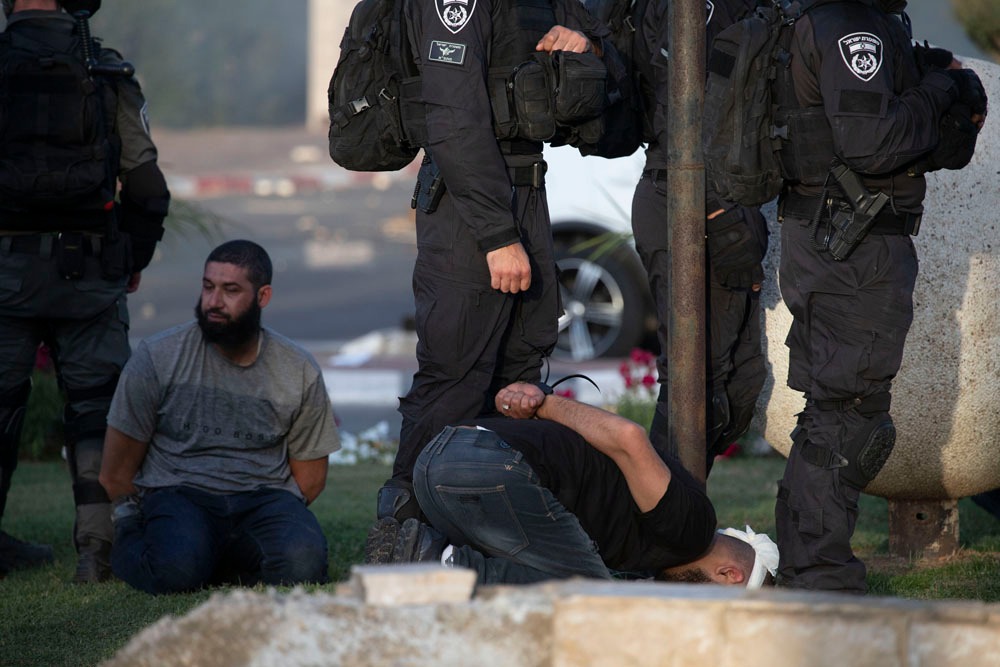
Many of the detainees and their families were not fully aware of their rights, and many of the accused were in fact under the age of 18, explained Tuma. Under Israeli law, minors are supposed to be released until they are formally charged; but in May 2021, the prosecution usually got away with keeping the detainees locked up for extended periods without charge.
According to the lawyers, each detainee is usually facing between five to 10 different charges. At the same time, most of the evidence was extracted as confessions from other detainees — just like in Haitham’s case — and likely under duress or torture.
For example, testimonies from former Palestinian detainees who were held at the Nazareth police station in May reveal rampant and systemic Israeli police attacks on Palestinian citizens of Israel, including protesters, minors, innocent bystanders, and even attorneys. The graphic statements collected by the Palestinian legal center Adalah, which include accounts of physical, verbal, and psychological abuse, indicate that Israeli officers effectively ran a “torture room” inside the Nazareth police station.
Tuma described how, during interrogations of detainees, the Israeli police regularly threatened or inflicted extreme violence and terrorization. “The mention of one’s mother and sister as a threat against their ‘honor,’ photoshopping a funeral and convincing the detainee that his mother died… were just a few of the methods the investigators used,” she said.
Echoing the other lawyers, Tuma affirmed that many if not most of the accusations issued against Palestinian detainees fell under what Israel defines as “nationalistic motive,” a securitized offense that makes the case much harder to tackle in court. “The public prosecution always asked for the highest sentence for all the charges,” said Tuma. “The prosecution also always appealed the length of the sentence, and succeeded in all cases in lengthening the period of arrest [before sentencing].”
The indictment lists often started with excessive charges, but the volunteer lawyers questioned their evidentiary basis and usually managed to reduce the number and severity of the charges. For example, in charges involving stone-throwing, which under Israeli law can incur a punishment between two and four years, the public prosecution would ask for four years. Tuma added that the prosecution tended to deliberately target minors for this offense, in order to “teach the whole generation a lesson.”
Palestinian citizens’ response to this repression — creating their own organizing mechanisms to protect and support their community — has proven both inspiring and pivotal. Back in Akka, Umm Haitham praised the city’s popular youth committee for their emotional support of the families, as well as other locals who supported the families financially. At the same time, she criticized Arab Knesset members and other Arab officials for their absence.
“Politicians just gave speeches and did not actually help us on the ground,” she said. “Unfortunately, they let us down. It was disgusting how I would call them for help and they never did. They only barked. I never expected to need them, but not a single Knesset member helped when I [requested it]. Even the Arab municipality members let us down and acted selfishly.”
Despite it all, Nassra believes that May’s uprising, and the way that the Palestinian community has mobilized ever since, marked a point of no return both in Akka and across historic Palestine. “We created a new consciousness,” he said. “The new generation is very aware of what is happening. The coexistence bubble burst, and the lie no longer sticks. I have never seen anything like this generation who, despite all the oppression, love their freedom and dignity even more.”

